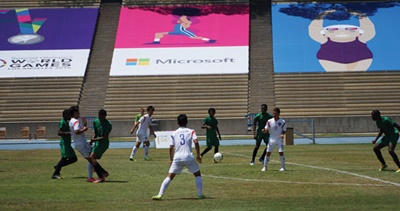In many ways, the pinnacle of achievement at the Special Olympics is the personal best, not the gold medal. But when thousands of athletes from more than 160 countries converged for World Games in the past, organizers rarely could know their prior records with certainty.
That ended this year, thanks to an extensive four-year sponsorship deal with Microsoft that’s modernizing every facet of the Special Olympics’ technology.
 |
The partnership was on display at the World Games.
Photo by: MICROSOFT |
So when Paraguayan track and field athlete Monica Prieto finished the 10,000-meter run in her best time ever July 26, the Special Olympics Twitter account sent an automated celebratory message to the world, and fans in the venue were informed immediately.
“We were ecstatic,” said Special Olympics Chief Technology Officer Noah Broadwater, noting that coaches used to bring athletes’ results history to the Games on paper.
The just-completed World Games in Los Angeles were the coming-out party for the 9-month-old Microsoft deal. Microsoft has agreed to build a consolidated worldwide database of 4.5 million Special Olympians, including performance history, medical records, contact and family information and other details, all hosted on Microsoft’s Azure cloud and accessible in real time.
The management system built for the World Games is a small part of the database they eventually hope to build, Broadwater said, but it’s already revolutionized the nonprofit’s back office. Gone are the days when teams of 15 volunteers at every contest venue stayed up after midnight to type results into computers, and now coaches know immediately when their next opponent is determined in a tournament.
Microsoft is using its Special Olympics work as a case study in its business-to-business sales efforts, running an extensive ad campaign promoting its work with the World Games. One commercial features Special Olympics CEO Janet Froetscher saying: “With Microsoft Cloud, we save millions of man hours, and that’s time we can invest in our athletes, our work and changing the world.”
That spot and others are targeting business viewers on cable stations in the U.S. and Europe, as well as in airports, said Jeff Hansen, Microsoft’s general manager of brand strategy. The arrangement works well for Microsoft, which isn’t seeking the basic awareness boost that a traditional sports sponsorship provides.
“We tend not to have an awareness problem,” Hansen said. “But we can benefit from reminding people about the personal and cultural relevance of our technology.”
With the World Games done, Microsoft and the Special Olympics will now turn their attention toward building smaller, more manageable databases for local organizations to use. They’re hoping to populate the databases with medical records, doctor notes and eventually start analyzing the data for new research insights into medical care for people with intellectual disabilities.
The software giant also contributed 800 tablets and laptops and 1,200 Lumia phones to help volunteers input the data. Microsoft also has promised to raise at least $1 million for Special Olympics through its corporate giving campaign and in-store promotions.
Rob Prazmark, 21 Marketing founder and CEO, who negotiated directly with Microsoft on behalf of the Special Olympics, estimated the total value of the sponsorship at nearly $50 million over the four years, counting the in-kind technical work, the fundraising and paid media.
Microsoft stepped up after the sales process struck out with more than 20 other potential sponsors, he said, ending up with the largest deal in the nonprofit’s history. Ultimately, the nonprofit also added Citgo and expanded a deal with Toys R Us. The Games’ organizing committee landed Kaiser Permanente and Deloitte as event sponsors, joining longtime partners such as Coca-Cola, Bank of America and Mattel.
“A lot of people just didn’t get it,” Prazmark said. “What I think Microsoft is doing is showing these other corporations that it’s not only a good cause but you can also craft a very effective marketing campaign around it.”
In March, Special Olympics added another tech partner, DocuSign, whose products are being used to upload medical records and other signed documents into the database.




